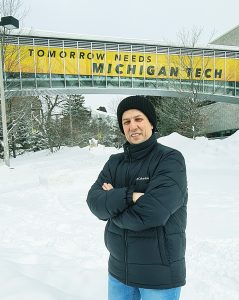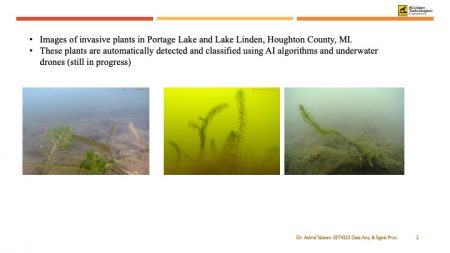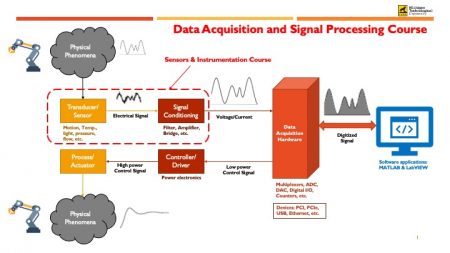
Ashraf Saleem’s background and undergraduate degree are in electrical and computer engineering. But when he graduated from Philadelphia University (Amman, Jordan) in 2000 with his bachelor’s, he was offered a fellowship to pursue his post-grad education in mechatronics.
At the time, he didn’t know very much about mechatronics. However, he recognized the fellowship as an excellent opportunity so he decided to learn more. He says mechatronics was fairly new then, but already well-known in Japan and Asia, and starting to take hold in Germany.
Saleem liked what he learned and he was especially attracted to the discipline’s integration of mechanical components with sensors, actuators, and Artificial Intelligence. So, he accepted the fellowship and began his master of science at DeMontfort University (Leicester, UK), receiving his M.S. in 2003. In 2006, he was awarded his Ph.D., also from DeMontfort University.
“Since then, I have developed a high interest in teaching and research in mechatronics,” Saleem says, adding that teaching mechatronics is very interesting because of its multi-disciplinary integration of mechanical systems with computer sensors and programming.
Until a few years ago, Saleem’s research focused mainly on the control side of mechatronics. But he was ready to concentrate on something practical—something that would serve humanity—so he transitioned from fundamental research to applied research.
At the time, he was teaching at Sultan Qaboos University (Muscat, Oman), which is located on the Strait of Hormuz between the Persian Gulf and the Gulf of Oman. He tasked an undergraduate research group he was supervising to start thinking about and searching for practical problems in Oman that they could address with their research.
“The students identified an environmental concern on the Omani coastline,” says Saleem. “We have an oil spill problem where ships pass through Strait of Hormuz. Once an oil spill reaches the coast it becomes a tragedy.”
The undergraduate group decided to apply mechatronics to solve this practical problem. With their preliminary research results, Saleem and his colleagues wrote a grant proposal to the Oman government, for which they were awarded a $185K grant in 2019. They began an extensive project to address this troubling oil spill problem using a drone and unmanned service vessel.
“The idea is, once we get an alarm that there is a potential oil spill, we send a drone on an unmanned vessel to determine if it’s an oil spill, which is a very fast process,” Saleem explains. “The drone flies over the location, collects images, and uses AI to analyze the images. If it is an oil spill, another team will be alerted so they can undertake efforts for early containment before the spill reaches the coast.”
A New Job, A New Country
Saleem says he was very happy at working at Sultan Qaboos University, but he’s always looking for new experiences.
“After seven years I found myself in the same loop and the same environment. Yes, I had very good projects and students there. I won many awards. But I said to myself, why not try different experiences, especially in a Western country?” he recalls.
What drew Saleem to Michigan Tech, in particular, is that the Mechatronics reside within the College of Computing, instead of the College of Engineering, which is more typical.
“Having mechatronics under computing interested me because It has a different perspective,” he explains. “I didn’t see this anywhere else. Researchers here want to explore the ‘brains’ of mechatronics;’ they want to look at the controllers in-depth. I’m interested in how we can develop more reliable and more intelligent controls.”
And when Saleem was interviewed by Michigan Tech faculty, he felt very welcome. “During the interview and the process of the recruitment, I got some very good impressions,” he explains, adding that two very important prerequisites to be productive in one’s work are to like what you are doing, and to have a good boss. He feels fortunate to have both at Michigan Tech.
“Dr. Saleem has a great combination of skill and enthusiasm for what he does in mechatronics, and that makes him a perfect fit for what we are trying to build here at Michigan Tech,” says Dan Fuhrmann, chair of the Applied computing department.
A Research Focus Shift

When Saleem joined Michigan Tech in fall 2021 he started talking with others about how he and his students could apply his previous applied research to address issues in the Great Lakes region. When he learned of the invasive plants affecting the ecology of Lake Superior, he reasoned that since his previous research was concerned with bodies of water, he would begin to pursue a solution to this worsening problem.
And he’s already begun. Saleem acquired an underwater drone with a camera and started collecting images in order to classify and identify these invasive plants. And he’s in contact with Michigan Tech faculty who study biology and ecology to learn how his research team can help them. This is now his main research interest, although he continues to work on several active industry projects.
“I have started my research in water here and I’m getting some good results,” Saleem says. “It’s applied research that serves humanity and we are trying to use our technology to solve this. I’m interested in this because you feel you are working for an ultimate goal which brings good for humanity.”
Saleem is engaging his undergraduate students in this research. “I talked with the students who are working on their senior design projects; at this stage they are mature and they have enough background to conduct research, with faculty supervision and direction. I provide them with concepts and equipment.”
“I found that the students have an interest in using AI to detect cracks in bridges. The idea is very good,” Saleem says. “Their ideas started evolving until we reached a very good project.”
The students are working on a solution to detect cracks in the interior and exterior walls of buildings, which are often difficult to reach. They talked with Michigan Tech Facilities Management personnel to compile a list of customer requirements, which they have converted to technical requirements. Their research plan is to employ a drone to reach high, hidden places. And this might lead to something bigger. “Why not use this drone and camera do find cracks in bridges, a very dangerous activity,” Saleem asks.
Saleem has acquired a camera and a LIDAR vision system, and he and the students will attach these components to a drone programmed with an AI algorithm. The drone will fly inside and around buildings and when it detects a crack, then the software will photograph the defect to aid in visualizing the defect to help maintenance professionals identify potential problems in their early stages.
Teaching Excellence

Saleem has been awarded several teaching awards. The most prestigious so far is a Distinguished Academician Award, awarded in 2017 by the College of Engineering at Sultan Qaboos University, granted in recognition of his outstanding teaching performance that academic year. “They give this award to just one person per year,” Saleem explains. “It’s very prestigious there. It is very competitive and I was fortunate to win. The criteria are very harsh.”
Saleem attributes his teaching and mentoring excellence to the relationships he develops with his students. “I listen carefully to them and my approach during classes is based on student feedback,” he says.
In his classes at Michigan Tech this semester, Saleem is using Mentimeter, an interactive technology that allows students to share thoughts and answers questions electronically, which then appear on Saleem’s presentation screen. He says it encourages students to participate and lets him adjust his lectures in real time to address student questions.
“I found this tool very helpful in the class,” Saleem says. “Sometimes I get 40-45 answers from the students. This makes the students more interested during the lecture. I’ve received some good feedback.”
Salem teaches two courses this academic year. Sensors and Instrumentation (EET 3131), which leads to Data Acquisition and Signal Processing (EET 4253). He’s revamping the courses for Industry 4.0 and to eliminate any overlap between the two courses, starting student learning from scratch, then working to the advanced level.
“By end of the first course, the students know the basics of sensors and measurements, they know their application, and they should be able to select the right sensor for that application,” Saleem explains.
“In the second course, students learn how to interface that sensor to a computer,” he continues. “They learn about data acquisition and how to interface the sensor system to the computer. And once the sensors are interfaced to the computer, they learn signal processing, how to convert the data into information, and finally complete the computer programming.”
Saleem adds that both classes focus on both hardware and software, such as how to interface the sensor system and actuator to the computer, and how to develop software that can read and act based on the sensor readings.
“While Ashraf has broad knowledge of the field of mechatronics, he has filled a gap we had in the critical area of sensors, instrumentation, and data acquisition,” Fuhrmann notes. “His course in sensors this semester has some 60 students, many of whom come from outside our department. This provides the perfect complement to our existing strengths in circuits, programmable logic controllers, and robotics”
Fuhrmann adds that Saleem is also working to revamp the Senior Design sequence in the Electrical Engineering Technology program, bringing more structure and accountability to the student projects.
Beyond Teaching and Research
When he’s not teaching and conducting research, Saleem describes himself as a family man. He has five children and he loves spending time with them. They range in age from one month to 16 years old. Saleem and his family enjoy living in Houghton and they have found the people here very welcoming and helpful.
“It’s very difficult when you move with a big family to a new country, a new city,” Saleem says. The people here have helped us a lot and the kids are enjoying their school,” he adds. “If your kids are happy in school and your wife likes her job, then you can focus best on your job, teaching, and research during the work day.”
Saleem’s spouse, Serein Al-Ratrout, is an adjunct assistant professor in the Michigan Tech Department of Computer Science.